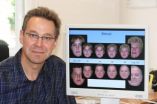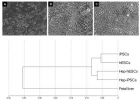(Press-News.org) How to look younger without plastic surgery? Psychologists of the Jena University (Germany) have a simple solution to this question: Those who want to look younger should surround themselves with older people. Because when viewing a 30-year-old we estimate his age to be much younger if we have previously been perceiving faces of older people.
"People are actually quite good at guessing the age of the person next to them," Dr. Holger Wiese says. The psychologist of the Jena University is responsible for one of six research projects in the DFG-sponsored research unit "Person Perception" lead by Professor Dr. Stefan R. Schweinberger.
In the experiment the Jena psychologists were able to prove that the volunteer testers were systematically wrong at estimating other people's age after having adapted to the faces of people of a specific age group by intensely looking at them. If many faces of elderly people were shown on the computer first, followed by the test face of a middle aged person, the test candidates estimated this person as substantially younger. After studying younger faces the middle aged test face was estimated as being substantially older. "These effects occur independently of the viewer's age and sex", Schweinberger says. However when adaptor face and test faces show people of the same sex the after-effects of age perception are even stronger: this is the study's second result. In other words: the perception of age and sex in faces is not a completely independent process. These results may hardly surprise non-experts but they contradict various previous opinions of experts.
The scientists of the Jena University used the most modern digital image editing techniques and a data bank of faces without any make-up and with distracting elements having been touched up. The first people partaking in the experiment were students. In a second so far unpublished study elderly people were being asked to give their estimations.
Stefan Schweinberger sums up the result of their findings: "We are able to change the subjective perception of a face." Nobody knows though how long this effect lasts. Holger Wiese adds: "The age of the person next to you is one of the most important characteristics for our perception of other people. This leads to exciting crossovers into other areas of scientists who are dealing with the interactions of social groups."
The founder of the "Playboy" magazine might be surprised by these findings of the Jena scientists. Because he prefers to surround himself with young women, not knowing that they make him look much older. So Hugh Hefner should surround himself with elderly gentlemen instead of perhaps thinking of plastic surgery.
The Jena psychologists have just published their scientific findings in the scientific journal Vision Research: Stefan R. Schweinberger, Romi Zäske, Christian Walther, Jessika Golle, Gyula Kovács, Holger Wiese: Young without plastic surgery: Perceptual adaptation to the age of female and male faces."
INFORMATION:
The publication can be found at: www.elsevier.com/locate/visres.
Contact Details:
Prof. Dr. Stefan R. Schweinberger / Dr. Holger Wiese
Institute of Psychology
Friedrich Schiller University Jena
Am Steiger 3, Haus 1
D-07743 Jena
Tel.: +049 (0)3641 / 945181 or 945185
Email: Stefan.Schweinberger@uni-jena.de / Holger.Wiese@uni-jena.de
How to look younger without plastic surgery
Psychologists of Jena University show systematic change in the perception of faces
2011-01-06
ELSE PRESS RELEASES FROM THIS DATE:
Hepatitis C: In 2011, a predictive marker for response to therapy
2011-01-06
Scientists at Inserm and Institut Pasteur have performed biomarker discovery on patients being treated for chronic hepatitis C infection. Their work, published in The Journal of Clinical Investigation, demonstrates that the plasma levels of the protein IP-10 predict, prior to treatment initiation, the efficacy of treatment with pegylated-interferon and ribavirin. Based on these results, the scientists have developed a prognostic test. Commercialization is anticipated in 2011, and will help inform physicians of the chances that patients will respond to standard treatment ...
Helicopter transport increases survival for seriously injured patients
2011-01-06
Severely injured patients transported by helicopter from the scene of an accident are more likely to survive than patients brought to trauma centers by ground ambulance, according to a new study published in The Journal of Trauma: Injury, Infection, and Critical Care. The study is the first to examine the role of helicopter transport on a national level and includes the largest number of helicopter-transport patients in a single analysis.
The finding that helicopter transport positively impacts patient survival comes amid an ongoing debate surrounding the role of helicopter ...
Is the hornet our key to renewable energy?
2011-01-06
As every middle-school child knows, in the process of photosynthesis, plants take the sun's energy and convert it to electrical energy. Now a Tel Aviv University team has demonstrated how a member of the animal kingdom, the Oriental hornet, takes the sun's energy and converts it into electric power -- in the brown and yellow parts of its body -- as well.
"The interesting thing here is that a living biological creature does a thing like that," says physicist Prof. David Bergman of Tel Aviv University's School of Physics and Astronomy, who was part of the team that made ...
Exercise may lower risk of death for men with prostate cancer
2011-01-06
Boston, MA – A new study of men with prostate cancer finds that physical activity is associated with a lower risk of overall mortality and of death due to prostate cancer. The Harvard School of Public Health and University of California, San Francisco researchers also found that men who did more vigorous activity had the lowest risk of dying from the disease. It is the first study in men with prostate cancer to evaluate physical activity after diagnosis in relation to prostate cancer-specific mortality and overall mortality.
The study appears in an advance online edition ...
Where MRSA colonizes on the human body
2011-01-06
PROVIDENCE, RI – When methicillin-resistant S. aureus (MRSA) is carried in the nose (nares), it is a risk factor for an invasive infection, including a surgical site infection. Some studies have found that the heavier the carriage of MRSA in the nose, the greater the risk of transmission to others and the greater risk of infection to the patient. Few studies to date have assessed the differences in quantity of MRSA at different body sites. A new study from Rhode Island Hospital now sheds light on both the quantity of MRSA at different body sites and the relationship between ...
Thermostatic mixer valves could significantly reduce the risk of scalding in children, study finds
2011-01-06
Using a thermostatic mixer valve to control the maximum temperature of children's bath water can significantly reduce the temperature of hot bath water and should reduce the risk of scalding, according to researchers at The University of Nottingham.
The study, carried out in partnership with Glasgow Housing Association, found that families with a thermostatic mixing valve (TMV) fitted to the hot and cold water pipes in their bathroom had bath water temperatures that were up to 11˚C cooler than those without and their baths were within the recommended temperature ...
Different sources, same result
2011-01-06
Numerous patients suffering from chronic liver diseases are currently receiving inadequate treatment due to the lack of organs donated for transplantation. However, hepatocytes derived from induced pluripotent stem cells (iPSCs) could offer an alternative for the future. Scientists from the Max Planck Institute for Molecular Genetics in Berlin compared hepatocytes from embryonic stem cells with hepatocytes from iPS cells and found that their gene expression is very similar. Nevertheless, in comparison to "real" hepatocytes, just under half of the genes exhibited a different ...
Protective properties of green tea uncovered
2011-01-06
Regularly drinking green tea could protect the brain against developing Alzheimer's and other forms of dementia, according to latest research by scientists at Newcastle University.
The study, published in the academic journal Phytomedicine, also suggests this ancient Chinese remedy could play a vital role in protecting the body against cancer.
Led by Dr Ed Okello, the Newcastle team wanted to know if the protective properties of green tea – which have previously been shown to be present in the undigested, freshly brewed form of the drink – were still active once the tea ...
ICU communication study reveals complexities of family decision-making
2011-01-06
While a much hailed communication intervention works for families making decisions for chronically-ill loved ones in medical intensive care units, Case Western Reserve University researchers found the intervention was less effective for surgical and neurological ICU patients.
Barbara Daly and Sara Douglas, the study's lead researchers from the Frances Payne Bolton School of Nursing at Case Western Reserve, attribute the varied results to different types of patients served by the three types of ICUs and differences among ICU cultures.
"We found the same approach is ...
Prestigious journal validates Asian carp research
2011-01-06
The use of environmental DNA (eDNA) by scientists from the University of Notre Dame and The Nature Conservancy to detect invasive Asian carp in the Chicago-area waterway has been validated in Conservation Letters, a new flagship peer-reviewed journal published by the Society for Conservation Biology.
"When you are dealing with cutting-edge research like eDNA, a very important part of the process is getting your science peer-reviewed and published in a well-respected journal," said Professor David Lodge, director of the University of Notre Dame's Environmental Change Initiative. ...
LAST 30 PRESS RELEASES:
A “smart fluid” you can reconfigure with temperature
New research suggests myopia is driven by how we use our eyes indoors
Scientists develop first-of-its-kind antibody to block Epstein Barr virus
With the right prompts, AI chatbots analyze big data accurately
Leisure-time physical activity and cancer mortality among cancer survivors
Chronic kidney disease severity and risk of cognitive impairment
Research highlights from the first Multidisciplinary Radiopharmaceutical Therapy Symposium
New guidelines from NCCN detail fundamental differences in cancer in children compared to adults
Four NYU faculty win Sloan Foundation research fellowships
Personal perception of body movement changes when using robotic prosthetics
Study shows brain responses to wildlife images can forecast online engagement — and could help conservation messaging
Extreme heat and drought at flowering could put future wheat harvests at risk
Harlequin ichthyosis: a comprehensive review of pathogenesis, diagnosis, and management
Smithsonian planetary scientists discover recent tectonic activity on the Moon
Government censorship of Chinese chatbots
Incorporating a robotic leg into one’s body image
Brain imaging reveals how wildlife photos open donor wallets
Wiley to expand Advanced Portfolio
Invisible battery parts finally seen with pioneering technique
Tropical forests generate rainfall worth billions, study finds
A yeast enzyme helps human cells overcome mitochondrial defects
Bacteria frozen in ancient underground ice cave found to be resistant against 10 modern antibiotics
Rhododendron-derived drugs now made by bacteria
Admissions for child maltreatment decreased during first phase of COVID-19 pandemic, but ICU admissions increased later
Power in motion: transforming energy harvesting with gyroscopes
Ketamine high NOT related to treatment success for people with alcohol problems, study finds
1 in 6 Medicare beneficiaries depend on telehealth for key medical care
Maps can encourage home radon testing in the right settings
Exploring the link between hearing loss and cognitive decline
Machine learning tool can predict serious transplant complications months earlier
[Press-News.org] How to look younger without plastic surgeryPsychologists of Jena University show systematic change in the perception of faces

